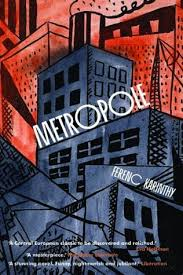Ferenc Karinthy - Metropole
Karinthy's Metropole was given to me in France over Christmas by my brother-in-law; it appears to have been published in French in 1999 by Editions DENOEL and in English in 2008 by Telegram (UK). is a Kafka-like novel. I had never heard of the novel or the author, but now understand that he was from Hungary, and according to the back cover, was a novelist, playwright, journalist and water polo champion. Busy people, these Hungarians!
As others have noted, it is a Kafkaesque tale, built on a simple premise (like The Trial, where Joseph K is under arrest but doesn't know why). In this case, the protagonist Budai is on a trip to Helsinki to attend a linguists' conference but someone ends up on the wrong plane, and subsequently, in an unknown, multicultural city, somewhere in the Northern Hemisphere (he eventually establishes, from the stars) but really - God-knows-where. Budai's incomprehension at his fate bears some similarity to Joseph K; it's a matter of a European bureaucracy
and initial rage against the scandal of ill-treatment ('He hardly knew what he was shouting. He demanded his passport and aeroplane ticket; he wanted to see the manager, he called for an interpreter, he raged and threatened ... p.20). From here, it's a slow path to reconciliation and an acceptance of his fate, to be a stranger in a strange land, to live and function without his former identity and despite his vast knowledge of languages, to be able to make no (and eventually, only some) understanding of a language which sounds something like this: 'Gorrabittepropopotu? Vivi tereplebeubeu?' (p.23).
The blurb describes the novel as 'suspenseful' but this is stretching things. It's more like agonising; it's the tradition of Beckett and perhaps Sartre ('No Exit'). It's an absurd premise which would make a neat short story but I think could only turn into a novel and be published as such by a Hungarian living in the Soviet-era (it was published in 1970). The novel develops some conventional ideas, such as a relationship with a lift attendant that keeps the protagonist going for a while, but eventually he ends up on the streets, and joins the bums earning a pittance loading and unloading trucks around the markets. I thought of the end of Paul Auster's City of Glass when I read this section. The last part of the novel involves Budai accidently joining in a violent revolutionary movement from which he eventually flees. The ending is ambiguous and yes, the novel is haunting as promised (if only because it sort of echoes a fate which you read as universal and yet Other). I'd recommend this book, but only for readers happy to suffer a little for their art (the art of reading). Dystopias are not meant to be fun, but the absurdist humour comes close; it's not so much 'the pleasure of the text' as 'the pleasurable agony of the text'.
As others have noted, it is a Kafkaesque tale, built on a simple premise (like The Trial, where Joseph K is under arrest but doesn't know why). In this case, the protagonist Budai is on a trip to Helsinki to attend a linguists' conference but someone ends up on the wrong plane, and subsequently, in an unknown, multicultural city, somewhere in the Northern Hemisphere (he eventually establishes, from the stars) but really - God-knows-where. Budai's incomprehension at his fate bears some similarity to Joseph K; it's a matter of a European bureaucracy
and initial rage against the scandal of ill-treatment ('He hardly knew what he was shouting. He demanded his passport and aeroplane ticket; he wanted to see the manager, he called for an interpreter, he raged and threatened ... p.20). From here, it's a slow path to reconciliation and an acceptance of his fate, to be a stranger in a strange land, to live and function without his former identity and despite his vast knowledge of languages, to be able to make no (and eventually, only some) understanding of a language which sounds something like this: 'Gorrabittepropopotu? Vivi tereplebeubeu?' (p.23).
The blurb describes the novel as 'suspenseful' but this is stretching things. It's more like agonising; it's the tradition of Beckett and perhaps Sartre ('No Exit'). It's an absurd premise which would make a neat short story but I think could only turn into a novel and be published as such by a Hungarian living in the Soviet-era (it was published in 1970). The novel develops some conventional ideas, such as a relationship with a lift attendant that keeps the protagonist going for a while, but eventually he ends up on the streets, and joins the bums earning a pittance loading and unloading trucks around the markets. I thought of the end of Paul Auster's City of Glass when I read this section. The last part of the novel involves Budai accidently joining in a violent revolutionary movement from which he eventually flees. The ending is ambiguous and yes, the novel is haunting as promised (if only because it sort of echoes a fate which you read as universal and yet Other). I'd recommend this book, but only for readers happy to suffer a little for their art (the art of reading). Dystopias are not meant to be fun, but the absurdist humour comes close; it's not so much 'the pleasure of the text' as 'the pleasurable agony of the text'.




Comments
Post a Comment